Critical Analysis of Australia's System: Gaoling for Unpaid Fines
VerifiedAdded on 2020/06/03
|8
|2659
|50
Essay
AI Summary
This essay examines the contentious practice of gaoling individuals in Australia for unpaid fines, particularly focusing on its legal and social ramifications. It details the legal framework, including the Infringement Notice Enforcement Act 1994, and explores how this system disproportionately affects marginalized communities, especially Indigenous Australians. The essay highlights the increasing incarceration rates due to unpaid fines, the role of the State Debt Recovery Office, and the varying approaches across different states like New South Wales, Victoria, and Queensland. It also discusses the objectives of criminal law, such as retribution, deterrence, incapacitation, rehabilitation, and restoration, in relation to this practice. The essay critically analyzes the failures of the system, citing cases like that of Ms. Dhu, and argues for legal reforms to address the issue of unpaid fines more effectively, considering the potential violation of human rights and the need for alternative approaches to avoid imprisonment.
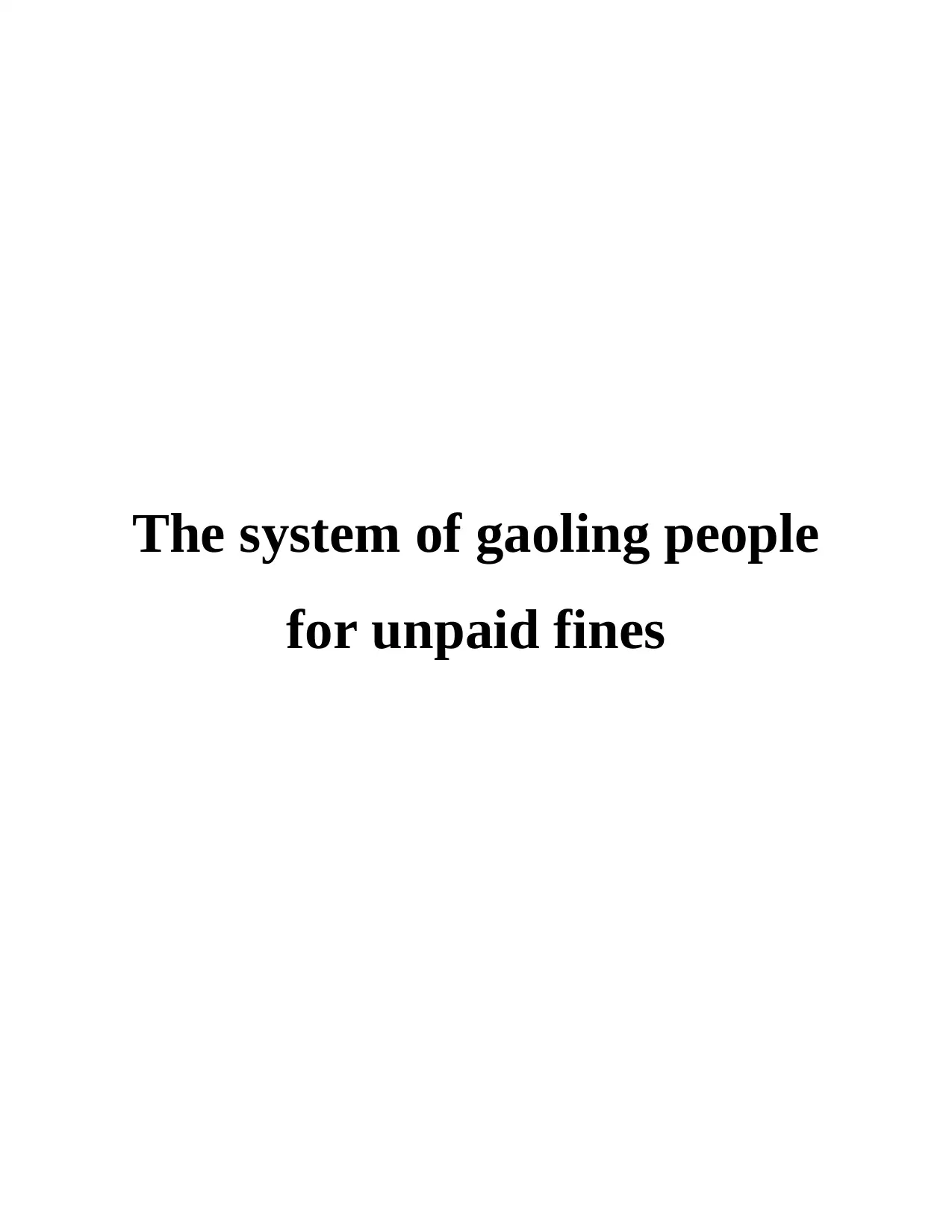
The system of gaoling people
for unpaid fines
for unpaid fines
Paraphrase This Document
Need a fresh take? Get an instant paraphrase of this document with our AI Paraphraser
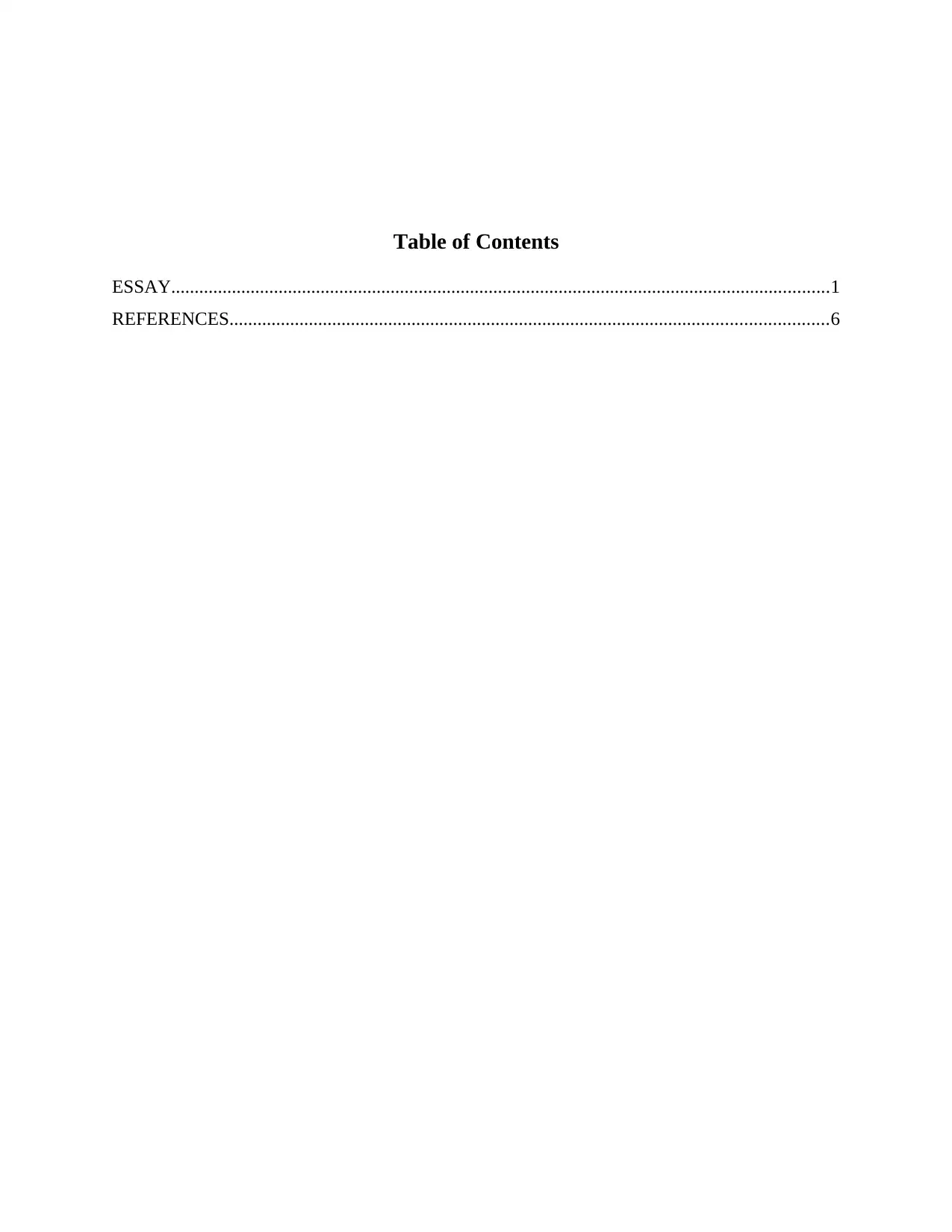
Table of Contents
ESSAY.............................................................................................................................................1
REFERENCES................................................................................................................................6
ESSAY.............................................................................................................................................1
REFERENCES................................................................................................................................6
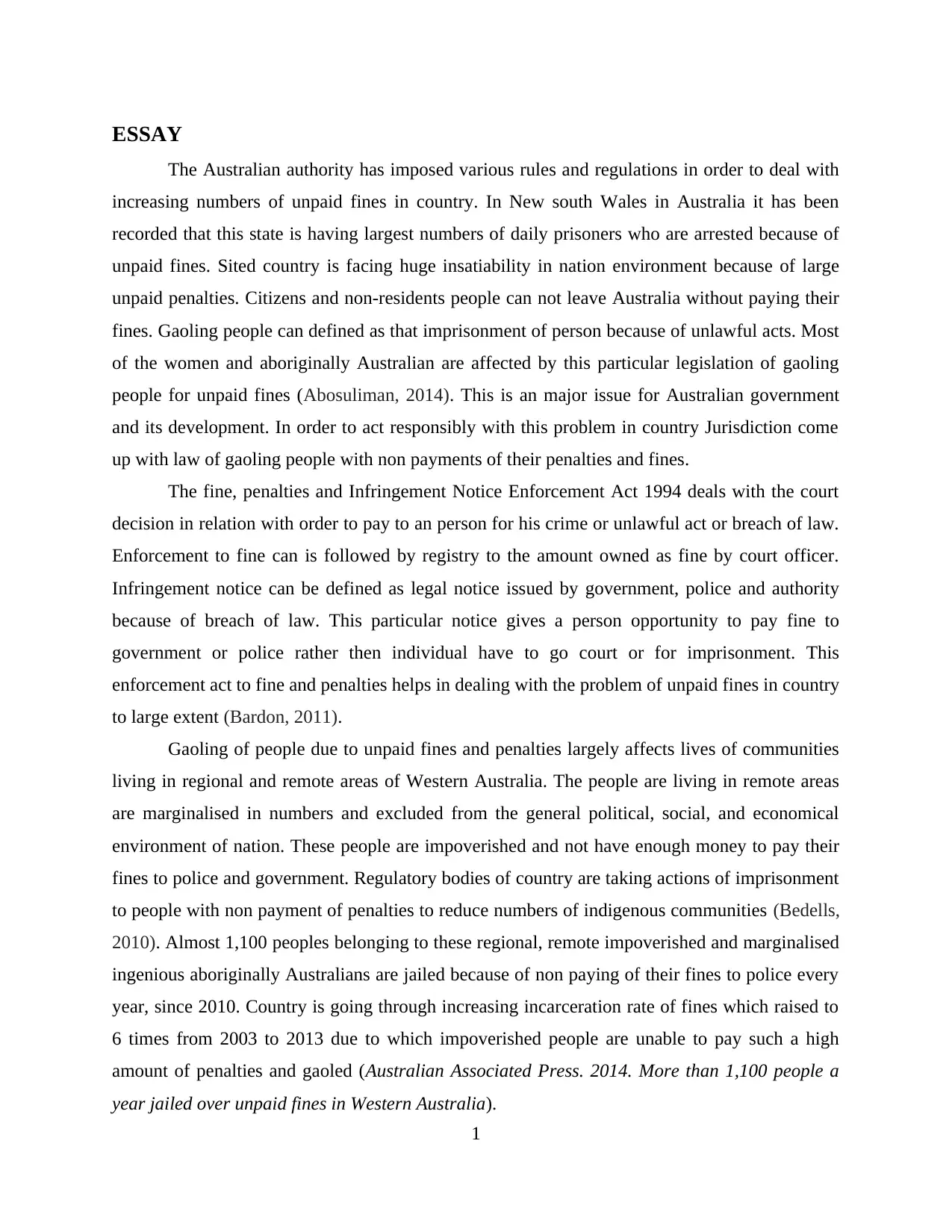
ESSAY
The Australian authority has imposed various rules and regulations in order to deal with
increasing numbers of unpaid fines in country. In New south Wales in Australia it has been
recorded that this state is having largest numbers of daily prisoners who are arrested because of
unpaid fines. Sited country is facing huge insatiability in nation environment because of large
unpaid penalties. Citizens and non-residents people can not leave Australia without paying their
fines. Gaoling people can defined as that imprisonment of person because of unlawful acts. Most
of the women and aboriginally Australian are affected by this particular legislation of gaoling
people for unpaid fines (Abosuliman, 2014). This is an major issue for Australian government
and its development. In order to act responsibly with this problem in country Jurisdiction come
up with law of gaoling people with non payments of their penalties and fines.
The fine, penalties and Infringement Notice Enforcement Act 1994 deals with the court
decision in relation with order to pay to an person for his crime or unlawful act or breach of law.
Enforcement to fine can is followed by registry to the amount owned as fine by court officer.
Infringement notice can be defined as legal notice issued by government, police and authority
because of breach of law. This particular notice gives a person opportunity to pay fine to
government or police rather then individual have to go court or for imprisonment. This
enforcement act to fine and penalties helps in dealing with the problem of unpaid fines in country
to large extent (Bardon, 2011).
Gaoling of people due to unpaid fines and penalties largely affects lives of communities
living in regional and remote areas of Western Australia. The people are living in remote areas
are marginalised in numbers and excluded from the general political, social, and economical
environment of nation. These people are impoverished and not have enough money to pay their
fines to police and government. Regulatory bodies of country are taking actions of imprisonment
to people with non payment of penalties to reduce numbers of indigenous communities (Bedells,
2010). Almost 1,100 peoples belonging to these regional, remote impoverished and marginalised
ingenious aboriginally Australians are jailed because of non paying of their fines to police every
year, since 2010. Country is going through increasing incarceration rate of fines which raised to
6 times from 2003 to 2013 due to which impoverished people are unable to pay such a high
amount of penalties and gaoled (Australian Associated Press. 2014. More than 1,100 people a
year jailed over unpaid fines in Western Australia).
1
The Australian authority has imposed various rules and regulations in order to deal with
increasing numbers of unpaid fines in country. In New south Wales in Australia it has been
recorded that this state is having largest numbers of daily prisoners who are arrested because of
unpaid fines. Sited country is facing huge insatiability in nation environment because of large
unpaid penalties. Citizens and non-residents people can not leave Australia without paying their
fines. Gaoling people can defined as that imprisonment of person because of unlawful acts. Most
of the women and aboriginally Australian are affected by this particular legislation of gaoling
people for unpaid fines (Abosuliman, 2014). This is an major issue for Australian government
and its development. In order to act responsibly with this problem in country Jurisdiction come
up with law of gaoling people with non payments of their penalties and fines.
The fine, penalties and Infringement Notice Enforcement Act 1994 deals with the court
decision in relation with order to pay to an person for his crime or unlawful act or breach of law.
Enforcement to fine can is followed by registry to the amount owned as fine by court officer.
Infringement notice can be defined as legal notice issued by government, police and authority
because of breach of law. This particular notice gives a person opportunity to pay fine to
government or police rather then individual have to go court or for imprisonment. This
enforcement act to fine and penalties helps in dealing with the problem of unpaid fines in country
to large extent (Bardon, 2011).
Gaoling of people due to unpaid fines and penalties largely affects lives of communities
living in regional and remote areas of Western Australia. The people are living in remote areas
are marginalised in numbers and excluded from the general political, social, and economical
environment of nation. These people are impoverished and not have enough money to pay their
fines to police and government. Regulatory bodies of country are taking actions of imprisonment
to people with non payment of penalties to reduce numbers of indigenous communities (Bedells,
2010). Almost 1,100 peoples belonging to these regional, remote impoverished and marginalised
ingenious aboriginally Australians are jailed because of non paying of their fines to police every
year, since 2010. Country is going through increasing incarceration rate of fines which raised to
6 times from 2003 to 2013 due to which impoverished people are unable to pay such a high
amount of penalties and gaoled (Australian Associated Press. 2014. More than 1,100 people a
year jailed over unpaid fines in Western Australia).
1
⊘ This is a preview!⊘
Do you want full access?
Subscribe today to unlock all pages.

Trusted by 1+ million students worldwide
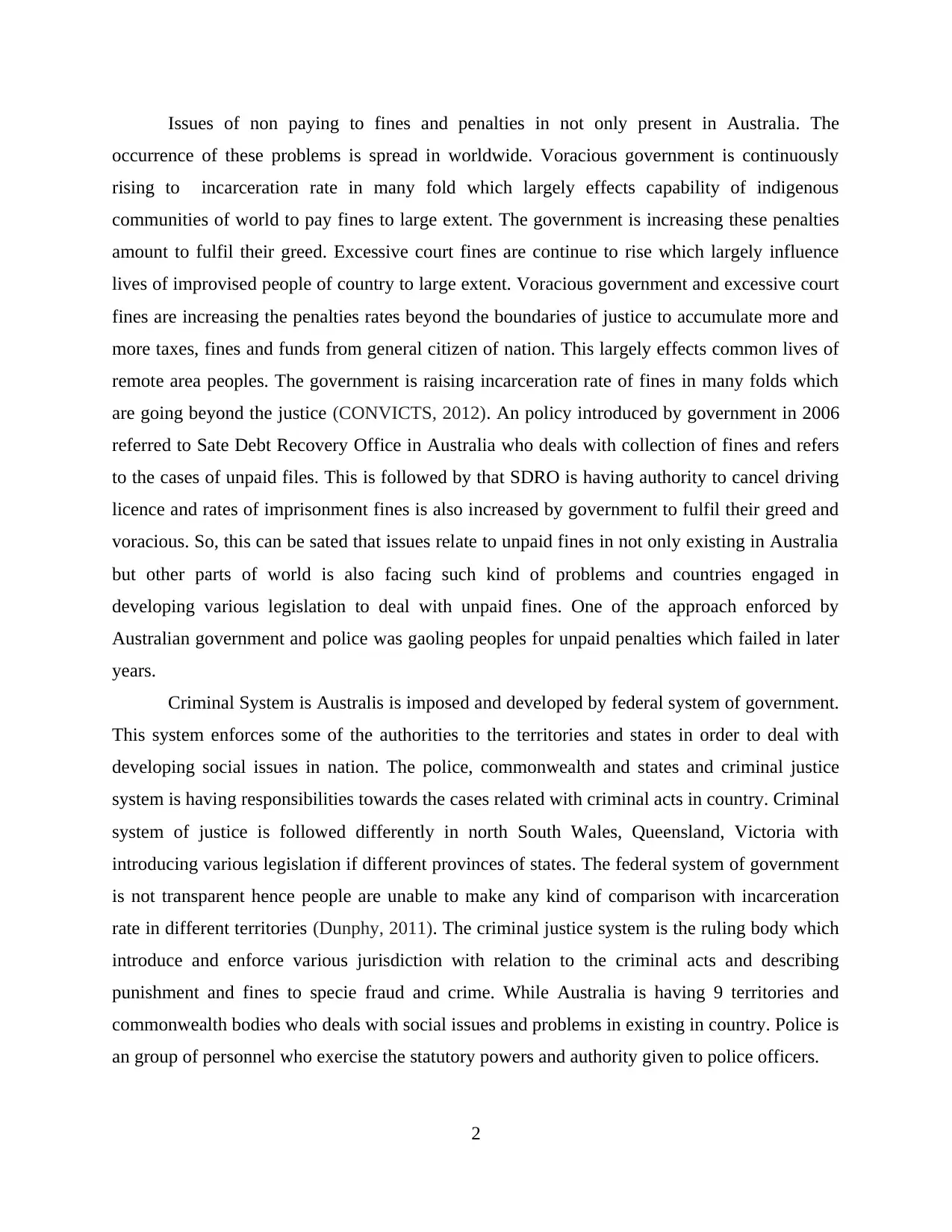
Issues of non paying to fines and penalties in not only present in Australia. The
occurrence of these problems is spread in worldwide. Voracious government is continuously
rising to incarceration rate in many fold which largely effects capability of indigenous
communities of world to pay fines to large extent. The government is increasing these penalties
amount to fulfil their greed. Excessive court fines are continue to rise which largely influence
lives of improvised people of country to large extent. Voracious government and excessive court
fines are increasing the penalties rates beyond the boundaries of justice to accumulate more and
more taxes, fines and funds from general citizen of nation. This largely effects common lives of
remote area peoples. The government is raising incarceration rate of fines in many folds which
are going beyond the justice (CONVICTS, 2012). An policy introduced by government in 2006
referred to Sate Debt Recovery Office in Australia who deals with collection of fines and refers
to the cases of unpaid files. This is followed by that SDRO is having authority to cancel driving
licence and rates of imprisonment fines is also increased by government to fulfil their greed and
voracious. So, this can be sated that issues relate to unpaid fines in not only existing in Australia
but other parts of world is also facing such kind of problems and countries engaged in
developing various legislation to deal with unpaid fines. One of the approach enforced by
Australian government and police was gaoling peoples for unpaid penalties which failed in later
years.
Criminal System is Australis is imposed and developed by federal system of government.
This system enforces some of the authorities to the territories and states in order to deal with
developing social issues in nation. The police, commonwealth and states and criminal justice
system is having responsibilities towards the cases related with criminal acts in country. Criminal
system of justice is followed differently in north South Wales, Queensland, Victoria with
introducing various legislation if different provinces of states. The federal system of government
is not transparent hence people are unable to make any kind of comparison with incarceration
rate in different territories (Dunphy, 2011). The criminal justice system is the ruling body which
introduce and enforce various jurisdiction with relation to the criminal acts and describing
punishment and fines to specie fraud and crime. While Australia is having 9 territories and
commonwealth bodies who deals with social issues and problems in existing in country. Police is
an group of personnel who exercise the statutory powers and authority given to police officers.
2
occurrence of these problems is spread in worldwide. Voracious government is continuously
rising to incarceration rate in many fold which largely effects capability of indigenous
communities of world to pay fines to large extent. The government is increasing these penalties
amount to fulfil their greed. Excessive court fines are continue to rise which largely influence
lives of improvised people of country to large extent. Voracious government and excessive court
fines are increasing the penalties rates beyond the boundaries of justice to accumulate more and
more taxes, fines and funds from general citizen of nation. This largely effects common lives of
remote area peoples. The government is raising incarceration rate of fines in many folds which
are going beyond the justice (CONVICTS, 2012). An policy introduced by government in 2006
referred to Sate Debt Recovery Office in Australia who deals with collection of fines and refers
to the cases of unpaid files. This is followed by that SDRO is having authority to cancel driving
licence and rates of imprisonment fines is also increased by government to fulfil their greed and
voracious. So, this can be sated that issues relate to unpaid fines in not only existing in Australia
but other parts of world is also facing such kind of problems and countries engaged in
developing various legislation to deal with unpaid fines. One of the approach enforced by
Australian government and police was gaoling peoples for unpaid penalties which failed in later
years.
Criminal System is Australis is imposed and developed by federal system of government.
This system enforces some of the authorities to the territories and states in order to deal with
developing social issues in nation. The police, commonwealth and states and criminal justice
system is having responsibilities towards the cases related with criminal acts in country. Criminal
system of justice is followed differently in north South Wales, Queensland, Victoria with
introducing various legislation if different provinces of states. The federal system of government
is not transparent hence people are unable to make any kind of comparison with incarceration
rate in different territories (Dunphy, 2011). The criminal justice system is the ruling body which
introduce and enforce various jurisdiction with relation to the criminal acts and describing
punishment and fines to specie fraud and crime. While Australia is having 9 territories and
commonwealth bodies who deals with social issues and problems in existing in country. Police is
an group of personnel who exercise the statutory powers and authority given to police officers.
2
Paraphrase This Document
Need a fresh take? Get an instant paraphrase of this document with our AI Paraphraser
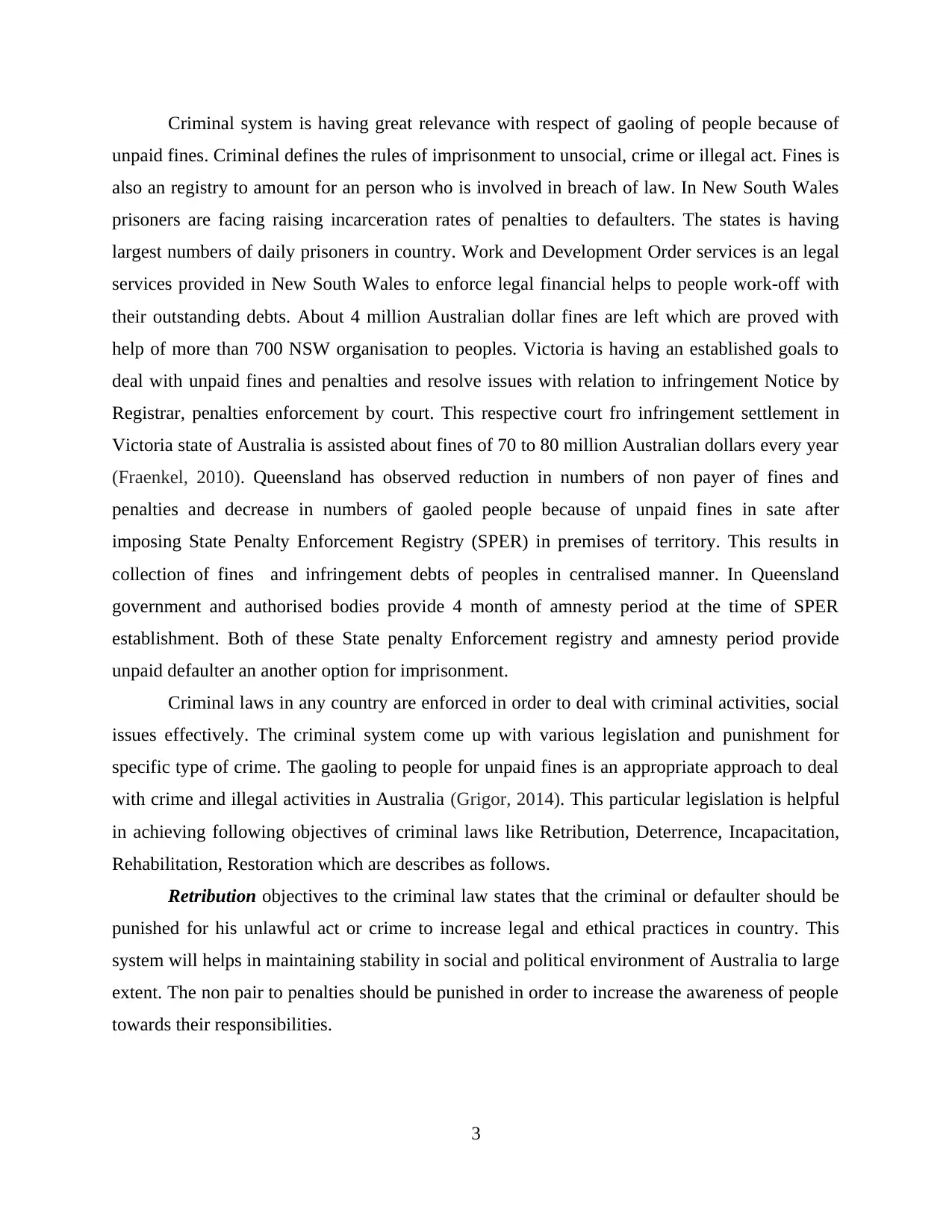
Criminal system is having great relevance with respect of gaoling of people because of
unpaid fines. Criminal defines the rules of imprisonment to unsocial, crime or illegal act. Fines is
also an registry to amount for an person who is involved in breach of law. In New South Wales
prisoners are facing raising incarceration rates of penalties to defaulters. The states is having
largest numbers of daily prisoners in country. Work and Development Order services is an legal
services provided in New South Wales to enforce legal financial helps to people work-off with
their outstanding debts. About 4 million Australian dollar fines are left which are proved with
help of more than 700 NSW organisation to peoples. Victoria is having an established goals to
deal with unpaid fines and penalties and resolve issues with relation to infringement Notice by
Registrar, penalties enforcement by court. This respective court fro infringement settlement in
Victoria state of Australia is assisted about fines of 70 to 80 million Australian dollars every year
(Fraenkel, 2010). Queensland has observed reduction in numbers of non payer of fines and
penalties and decrease in numbers of gaoled people because of unpaid fines in sate after
imposing State Penalty Enforcement Registry (SPER) in premises of territory. This results in
collection of fines and infringement debts of peoples in centralised manner. In Queensland
government and authorised bodies provide 4 month of amnesty period at the time of SPER
establishment. Both of these State penalty Enforcement registry and amnesty period provide
unpaid defaulter an another option for imprisonment.
Criminal laws in any country are enforced in order to deal with criminal activities, social
issues effectively. The criminal system come up with various legislation and punishment for
specific type of crime. The gaoling to people for unpaid fines is an appropriate approach to deal
with crime and illegal activities in Australia (Grigor, 2014). This particular legislation is helpful
in achieving following objectives of criminal laws like Retribution, Deterrence, Incapacitation,
Rehabilitation, Restoration which are describes as follows.
Retribution objectives to the criminal law states that the criminal or defaulter should be
punished for his unlawful act or crime to increase legal and ethical practices in country. This
system will helps in maintaining stability in social and political environment of Australia to large
extent. The non pair to penalties should be punished in order to increase the awareness of people
towards their responsibilities.
3
unpaid fines. Criminal defines the rules of imprisonment to unsocial, crime or illegal act. Fines is
also an registry to amount for an person who is involved in breach of law. In New South Wales
prisoners are facing raising incarceration rates of penalties to defaulters. The states is having
largest numbers of daily prisoners in country. Work and Development Order services is an legal
services provided in New South Wales to enforce legal financial helps to people work-off with
their outstanding debts. About 4 million Australian dollar fines are left which are proved with
help of more than 700 NSW organisation to peoples. Victoria is having an established goals to
deal with unpaid fines and penalties and resolve issues with relation to infringement Notice by
Registrar, penalties enforcement by court. This respective court fro infringement settlement in
Victoria state of Australia is assisted about fines of 70 to 80 million Australian dollars every year
(Fraenkel, 2010). Queensland has observed reduction in numbers of non payer of fines and
penalties and decrease in numbers of gaoled people because of unpaid fines in sate after
imposing State Penalty Enforcement Registry (SPER) in premises of territory. This results in
collection of fines and infringement debts of peoples in centralised manner. In Queensland
government and authorised bodies provide 4 month of amnesty period at the time of SPER
establishment. Both of these State penalty Enforcement registry and amnesty period provide
unpaid defaulter an another option for imprisonment.
Criminal laws in any country are enforced in order to deal with criminal activities, social
issues effectively. The criminal system come up with various legislation and punishment for
specific type of crime. The gaoling to people for unpaid fines is an appropriate approach to deal
with crime and illegal activities in Australia (Grigor, 2014). This particular legislation is helpful
in achieving following objectives of criminal laws like Retribution, Deterrence, Incapacitation,
Rehabilitation, Restoration which are describes as follows.
Retribution objectives to the criminal law states that the criminal or defaulter should be
punished for his unlawful act or crime to increase legal and ethical practices in country. This
system will helps in maintaining stability in social and political environment of Australia to large
extent. The non pair to penalties should be punished in order to increase the awareness of people
towards their responsibilities.
3
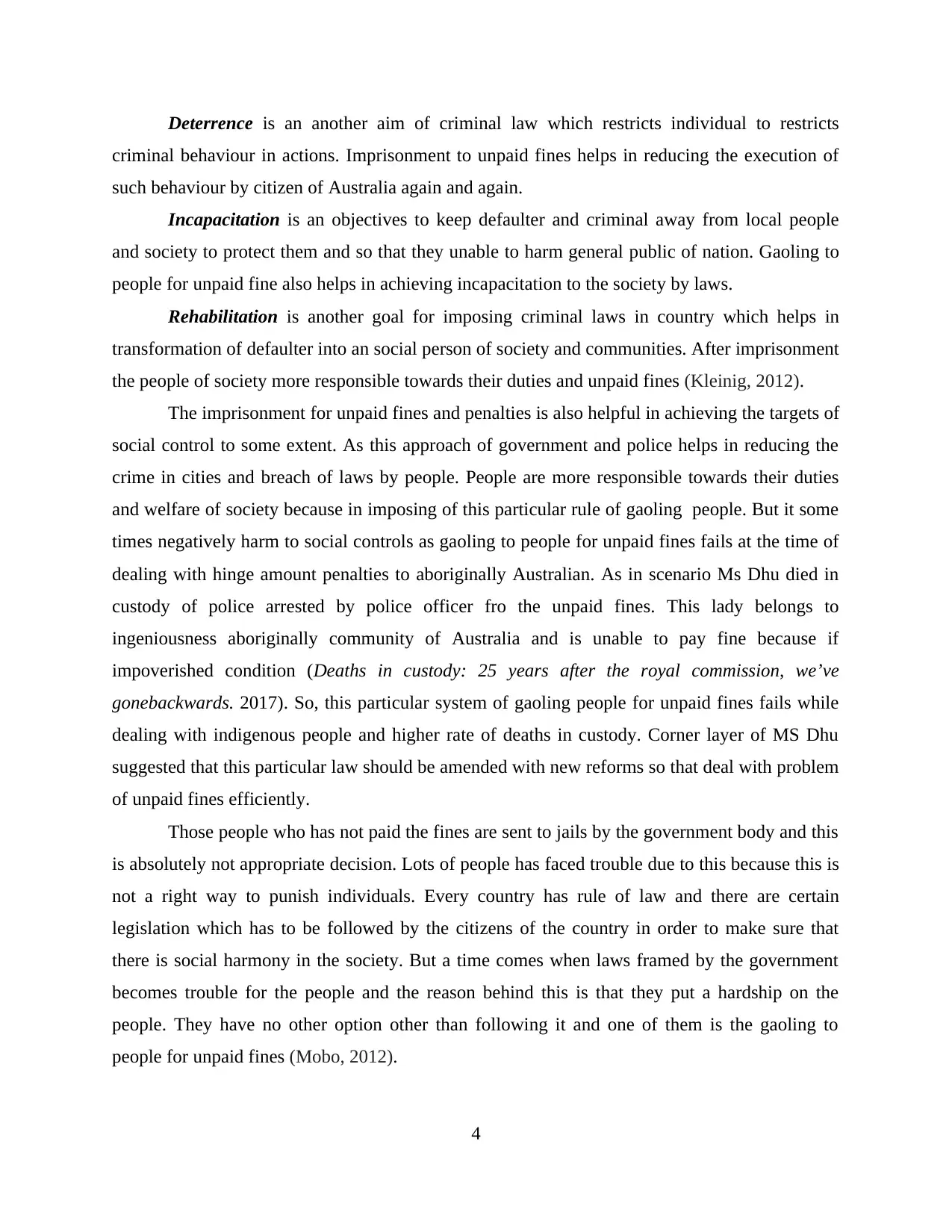
Deterrence is an another aim of criminal law which restricts individual to restricts
criminal behaviour in actions. Imprisonment to unpaid fines helps in reducing the execution of
such behaviour by citizen of Australia again and again.
Incapacitation is an objectives to keep defaulter and criminal away from local people
and society to protect them and so that they unable to harm general public of nation. Gaoling to
people for unpaid fine also helps in achieving incapacitation to the society by laws.
Rehabilitation is another goal for imposing criminal laws in country which helps in
transformation of defaulter into an social person of society and communities. After imprisonment
the people of society more responsible towards their duties and unpaid fines (Kleinig, 2012).
The imprisonment for unpaid fines and penalties is also helpful in achieving the targets of
social control to some extent. As this approach of government and police helps in reducing the
crime in cities and breach of laws by people. People are more responsible towards their duties
and welfare of society because in imposing of this particular rule of gaoling people. But it some
times negatively harm to social controls as gaoling to people for unpaid fines fails at the time of
dealing with hinge amount penalties to aboriginally Australian. As in scenario Ms Dhu died in
custody of police arrested by police officer fro the unpaid fines. This lady belongs to
ingeniousness aboriginally community of Australia and is unable to pay fine because if
impoverished condition (Deaths in custody: 25 years after the royal commission, we’ve
gonebackwards. 2017). So, this particular system of gaoling people for unpaid fines fails while
dealing with indigenous people and higher rate of deaths in custody. Corner layer of MS Dhu
suggested that this particular law should be amended with new reforms so that deal with problem
of unpaid fines efficiently.
Those people who has not paid the fines are sent to jails by the government body and this
is absolutely not appropriate decision. Lots of people has faced trouble due to this because this is
not a right way to punish individuals. Every country has rule of law and there are certain
legislation which has to be followed by the citizens of the country in order to make sure that
there is social harmony in the society. But a time comes when laws framed by the government
becomes trouble for the people and the reason behind this is that they put a hardship on the
people. They have no other option other than following it and one of them is the gaoling to
people for unpaid fines (Mobo, 2012).
4
criminal behaviour in actions. Imprisonment to unpaid fines helps in reducing the execution of
such behaviour by citizen of Australia again and again.
Incapacitation is an objectives to keep defaulter and criminal away from local people
and society to protect them and so that they unable to harm general public of nation. Gaoling to
people for unpaid fine also helps in achieving incapacitation to the society by laws.
Rehabilitation is another goal for imposing criminal laws in country which helps in
transformation of defaulter into an social person of society and communities. After imprisonment
the people of society more responsible towards their duties and unpaid fines (Kleinig, 2012).
The imprisonment for unpaid fines and penalties is also helpful in achieving the targets of
social control to some extent. As this approach of government and police helps in reducing the
crime in cities and breach of laws by people. People are more responsible towards their duties
and welfare of society because in imposing of this particular rule of gaoling people. But it some
times negatively harm to social controls as gaoling to people for unpaid fines fails at the time of
dealing with hinge amount penalties to aboriginally Australian. As in scenario Ms Dhu died in
custody of police arrested by police officer fro the unpaid fines. This lady belongs to
ingeniousness aboriginally community of Australia and is unable to pay fine because if
impoverished condition (Deaths in custody: 25 years after the royal commission, we’ve
gonebackwards. 2017). So, this particular system of gaoling people for unpaid fines fails while
dealing with indigenous people and higher rate of deaths in custody. Corner layer of MS Dhu
suggested that this particular law should be amended with new reforms so that deal with problem
of unpaid fines efficiently.
Those people who has not paid the fines are sent to jails by the government body and this
is absolutely not appropriate decision. Lots of people has faced trouble due to this because this is
not a right way to punish individuals. Every country has rule of law and there are certain
legislation which has to be followed by the citizens of the country in order to make sure that
there is social harmony in the society. But a time comes when laws framed by the government
becomes trouble for the people and the reason behind this is that they put a hardship on the
people. They have no other option other than following it and one of them is the gaoling to
people for unpaid fines (Mobo, 2012).
4
⊘ This is a preview!⊘
Do you want full access?
Subscribe today to unlock all pages.

Trusted by 1+ million students worldwide
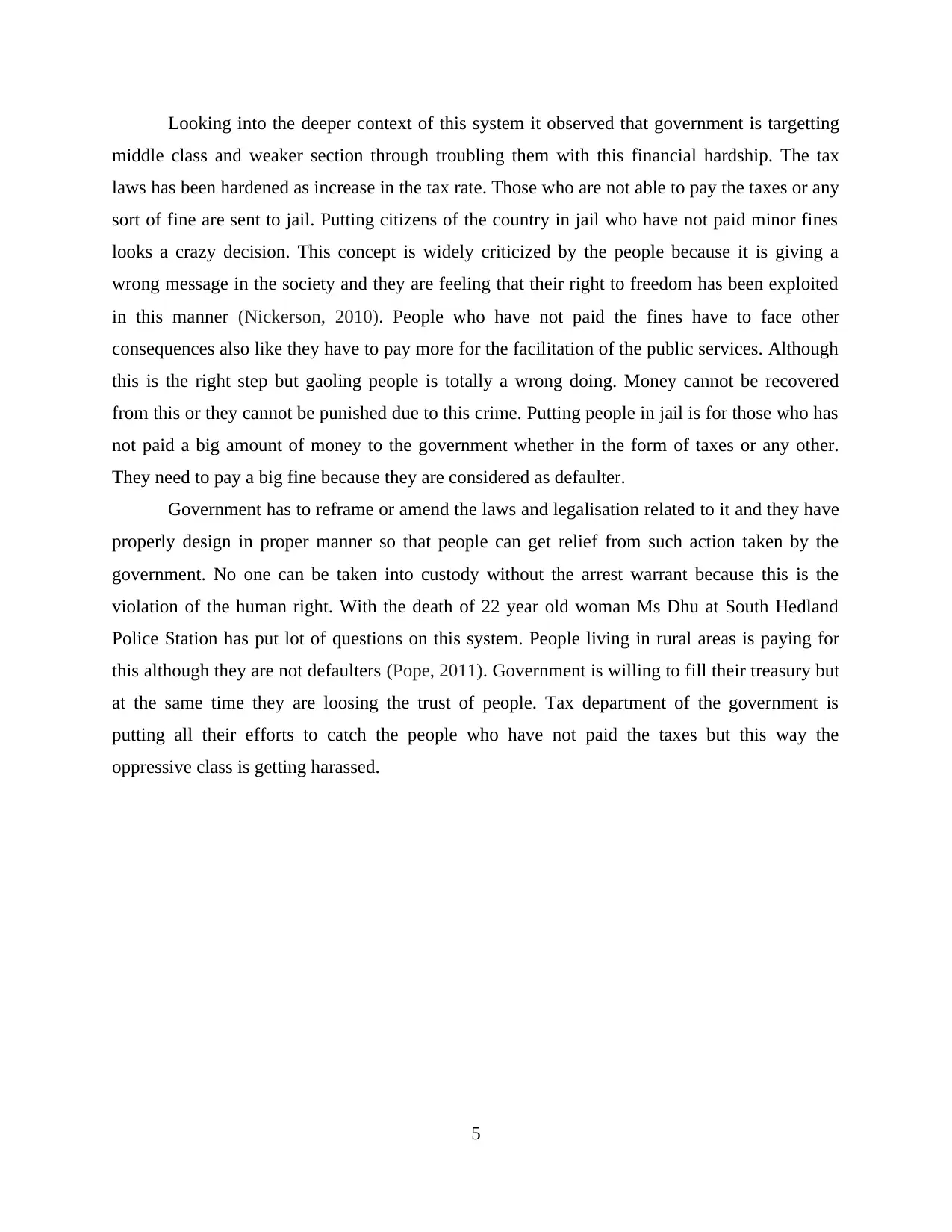
Looking into the deeper context of this system it observed that government is targetting
middle class and weaker section through troubling them with this financial hardship. The tax
laws has been hardened as increase in the tax rate. Those who are not able to pay the taxes or any
sort of fine are sent to jail. Putting citizens of the country in jail who have not paid minor fines
looks a crazy decision. This concept is widely criticized by the people because it is giving a
wrong message in the society and they are feeling that their right to freedom has been exploited
in this manner (Nickerson, 2010). People who have not paid the fines have to face other
consequences also like they have to pay more for the facilitation of the public services. Although
this is the right step but gaoling people is totally a wrong doing. Money cannot be recovered
from this or they cannot be punished due to this crime. Putting people in jail is for those who has
not paid a big amount of money to the government whether in the form of taxes or any other.
They need to pay a big fine because they are considered as defaulter.
Government has to reframe or amend the laws and legalisation related to it and they have
properly design in proper manner so that people can get relief from such action taken by the
government. No one can be taken into custody without the arrest warrant because this is the
violation of the human right. With the death of 22 year old woman Ms Dhu at South Hedland
Police Station has put lot of questions on this system. People living in rural areas is paying for
this although they are not defaulters (Pope, 2011). Government is willing to fill their treasury but
at the same time they are loosing the trust of people. Tax department of the government is
putting all their efforts to catch the people who have not paid the taxes but this way the
oppressive class is getting harassed.
5
middle class and weaker section through troubling them with this financial hardship. The tax
laws has been hardened as increase in the tax rate. Those who are not able to pay the taxes or any
sort of fine are sent to jail. Putting citizens of the country in jail who have not paid minor fines
looks a crazy decision. This concept is widely criticized by the people because it is giving a
wrong message in the society and they are feeling that their right to freedom has been exploited
in this manner (Nickerson, 2010). People who have not paid the fines have to face other
consequences also like they have to pay more for the facilitation of the public services. Although
this is the right step but gaoling people is totally a wrong doing. Money cannot be recovered
from this or they cannot be punished due to this crime. Putting people in jail is for those who has
not paid a big amount of money to the government whether in the form of taxes or any other.
They need to pay a big fine because they are considered as defaulter.
Government has to reframe or amend the laws and legalisation related to it and they have
properly design in proper manner so that people can get relief from such action taken by the
government. No one can be taken into custody without the arrest warrant because this is the
violation of the human right. With the death of 22 year old woman Ms Dhu at South Hedland
Police Station has put lot of questions on this system. People living in rural areas is paying for
this although they are not defaulters (Pope, 2011). Government is willing to fill their treasury but
at the same time they are loosing the trust of people. Tax department of the government is
putting all their efforts to catch the people who have not paid the taxes but this way the
oppressive class is getting harassed.
5
Paraphrase This Document
Need a fresh take? Get an instant paraphrase of this document with our AI Paraphraser
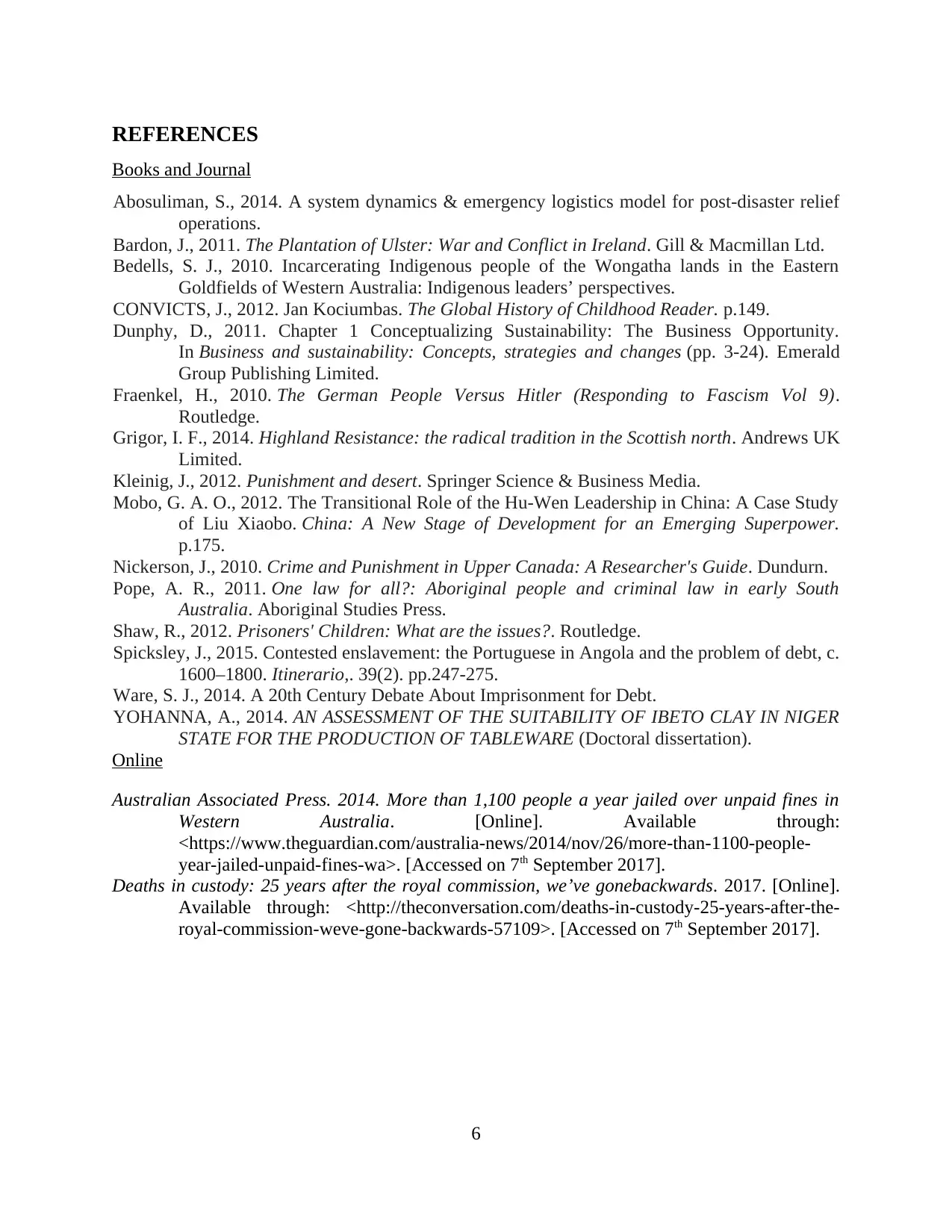
REFERENCES
Books and Journal
Abosuliman, S., 2014. A system dynamics & emergency logistics model for post-disaster relief
operations.
Bardon, J., 2011. The Plantation of Ulster: War and Conflict in Ireland. Gill & Macmillan Ltd.
Bedells, S. J., 2010. Incarcerating Indigenous people of the Wongatha lands in the Eastern
Goldfields of Western Australia: Indigenous leaders’ perspectives.
CONVICTS, J., 2012. Jan Kociumbas. The Global History of Childhood Reader. p.149.
Dunphy, D., 2011. Chapter 1 Conceptualizing Sustainability: The Business Opportunity.
In Business and sustainability: Concepts, strategies and changes (pp. 3-24). Emerald
Group Publishing Limited.
Fraenkel, H., 2010. The German People Versus Hitler (Responding to Fascism Vol 9).
Routledge.
Grigor, I. F., 2014. Highland Resistance: the radical tradition in the Scottish north. Andrews UK
Limited.
Kleinig, J., 2012. Punishment and desert. Springer Science & Business Media.
Mobo, G. A. O., 2012. The Transitional Role of the Hu-Wen Leadership in China: A Case Study
of Liu Xiaobo. China: A New Stage of Development for an Emerging Superpower.
p.175.
Nickerson, J., 2010. Crime and Punishment in Upper Canada: A Researcher's Guide. Dundurn.
Pope, A. R., 2011. One law for all?: Aboriginal people and criminal law in early South
Australia. Aboriginal Studies Press.
Shaw, R., 2012. Prisoners' Children: What are the issues?. Routledge.
Spicksley, J., 2015. Contested enslavement: the Portuguese in Angola and the problem of debt, c.
1600–1800. Itinerario,. 39(2). pp.247-275.
Ware, S. J., 2014. A 20th Century Debate About Imprisonment for Debt.
YOHANNA, A., 2014. AN ASSESSMENT OF THE SUITABILITY OF IBETO CLAY IN NIGER
STATE FOR THE PRODUCTION OF TABLEWARE (Doctoral dissertation).
Online
Australian Associated Press. 2014. More than 1,100 people a year jailed over unpaid fines in
Western Australia. [Online]. Available through:
<https://www.theguardian.com/australia-news/2014/nov/26/more-than-1100-people-
year-jailed-unpaid-fines-wa>. [Accessed on 7th September 2017].
Deaths in custody: 25 years after the royal commission, we’ve gonebackwards. 2017. [Online].
Available through: <http://theconversation.com/deaths-in-custody-25-years-after-the-
royal-commission-weve-gone-backwards-57109>. [Accessed on 7th September 2017].
6
Books and Journal
Abosuliman, S., 2014. A system dynamics & emergency logistics model for post-disaster relief
operations.
Bardon, J., 2011. The Plantation of Ulster: War and Conflict in Ireland. Gill & Macmillan Ltd.
Bedells, S. J., 2010. Incarcerating Indigenous people of the Wongatha lands in the Eastern
Goldfields of Western Australia: Indigenous leaders’ perspectives.
CONVICTS, J., 2012. Jan Kociumbas. The Global History of Childhood Reader. p.149.
Dunphy, D., 2011. Chapter 1 Conceptualizing Sustainability: The Business Opportunity.
In Business and sustainability: Concepts, strategies and changes (pp. 3-24). Emerald
Group Publishing Limited.
Fraenkel, H., 2010. The German People Versus Hitler (Responding to Fascism Vol 9).
Routledge.
Grigor, I. F., 2014. Highland Resistance: the radical tradition in the Scottish north. Andrews UK
Limited.
Kleinig, J., 2012. Punishment and desert. Springer Science & Business Media.
Mobo, G. A. O., 2012. The Transitional Role of the Hu-Wen Leadership in China: A Case Study
of Liu Xiaobo. China: A New Stage of Development for an Emerging Superpower.
p.175.
Nickerson, J., 2010. Crime and Punishment in Upper Canada: A Researcher's Guide. Dundurn.
Pope, A. R., 2011. One law for all?: Aboriginal people and criminal law in early South
Australia. Aboriginal Studies Press.
Shaw, R., 2012. Prisoners' Children: What are the issues?. Routledge.
Spicksley, J., 2015. Contested enslavement: the Portuguese in Angola and the problem of debt, c.
1600–1800. Itinerario,. 39(2). pp.247-275.
Ware, S. J., 2014. A 20th Century Debate About Imprisonment for Debt.
YOHANNA, A., 2014. AN ASSESSMENT OF THE SUITABILITY OF IBETO CLAY IN NIGER
STATE FOR THE PRODUCTION OF TABLEWARE (Doctoral dissertation).
Online
Australian Associated Press. 2014. More than 1,100 people a year jailed over unpaid fines in
Western Australia. [Online]. Available through:
<https://www.theguardian.com/australia-news/2014/nov/26/more-than-1100-people-
year-jailed-unpaid-fines-wa>. [Accessed on 7th September 2017].
Deaths in custody: 25 years after the royal commission, we’ve gonebackwards. 2017. [Online].
Available through: <http://theconversation.com/deaths-in-custody-25-years-after-the-
royal-commission-weve-gone-backwards-57109>. [Accessed on 7th September 2017].
6
1 out of 8
Your All-in-One AI-Powered Toolkit for Academic Success.
+13062052269
info@desklib.com
Available 24*7 on WhatsApp / Email
![[object Object]](/_next/static/media/star-bottom.7253800d.svg)
Unlock your academic potential
Copyright © 2020–2026 A2Z Services. All Rights Reserved. Developed and managed by ZUCOL.
